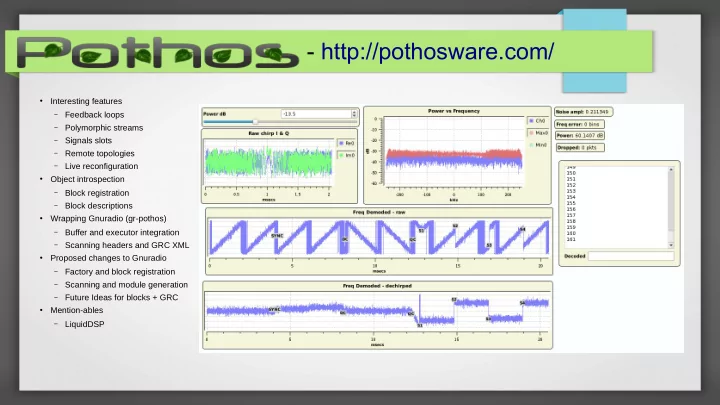

- http://pothosware.com/ Interesting features ● Feedback loops – Polymorphic streams – Signals slots – Remote topologies – Live reconfiguration – Object introspection ● Block registration – Block descriptions – Wrapping Gnuradio (gr-pothos) ● Buffer and executor integration – Scanning headers and GRC XML – Proposed changes to Gnuradio ● Factory and block registration – Scanning and module generation – Future Ideas for blocks + GRC – Mention-ables ● LiquidDSP –
Pothos – features of interest for gr-folks Core stuff GUI stuff – PothosFlow ● ● Reconfiguration while running Supports features above, etc… – – Feedback loops Widgets/potters are live in the graph – – Signals and slot Export design to JSON topology (*new*) – – Polymorphic streams Saving widget state (*new*) – – Single Block API Overlay support (*new*) – – Buffer forwarding https://github.com/pothosware/PothosFlow/wiki – – Remote distribution – https://github.com/pothosware/PothosCore/wiki – https://github.com/pothosware/PothosCore/wiki/SchedulerExplained –
Pothos – block descriptions Block descriptions are used for the GUI (kind of like GRC XML) ● Inline markup format that looks like doxygen (in cpp or hpp) ● Show example source – Generated into a JSON format consumed by the GUI ● PothosLiquidDSP and gr-pothos generate the JSON ● https://github.com/pothosware/PothosCore/wiki/BlocksCodingGuide ● https://github.com/pothosware/PothosCore/wiki/BlockDescriptionMarkup ●
Pothos features – in the works – TODO Code generation ● Qt support for JSON topology – Python and C++ generation – New GUI modes ● Going headless + reconnecting – Operate without live objects – Better API support for block interaction ● Output stream/msg data without topology – Access to streams outside of framework –
GNU Radio bindings - gr-pothos Ties in with gr-buffers, msgs, and tags ● Parses all of your headers and xml files ● Generates JSON block descriptions ● Generates modules with object registration ● Show the build/generator – it has colors ● How to plug into gr? Show some code ● https://github.com/pothosware/gr-pothos/wiki ●
gr-ideas: API for buffer, tag, msg access Use blocks like kernels – numpy, volk It works in gr-pothos, how-about a formal API? ● ● Enables better unit tests – in some cases Expose direct buffer, tag, msg injection and extraction ● ● Experiment with custom scheduling OOT 1) Pass in buffers and lengths in and out ● 2) Pass in input tags and input messages Buffers could come from DMA/OpenCl/etc ● 3) Existing executor: run_one_iteration() Or better integration with some hardware ● 4) Look at buffer lengths consumed and produced Finally, cleanup gr-pothos ● 5) Read out/pop any produced tags and messages no special friend class – Use the API and gr-modules – Just make block descriptions – Feed block Execute Handle resources the block results
gr-ideas: block factory + class registration Register my_block::make function under a unique name ● class block Register class methods of my_block ● { static block::sptr make(pmt_args…); Generalized APIs takes vector of pmt args ● pmt_t call(name, pmt_args); Cleanup with C++ template wrapper – //make API nice with C++11 below template<A…> Cleanup with pythonic wrapper – block::sptr make(const A &a…) { Build system generates block factory modules (automatic) ● args = pmt_t(a…); return block::make(args); Factory loads these modules by scanning the install path ● } The precedent here is that python + swig does this…. template<R, A…> ● R call(name, const A &a…) { args = pmt_t(a…); gr-modules pmt r = this→call(name, args); return pmt_to<T>(r); Core + OOT } };
gr-ideas: block factory what ifs... Create gr-blocks and gr-topologies only using the runtime API ● In c++, we don’t need headers for devel libs from OOT projects – In python, we don’t need to generate or import swig bindings – Build a topology entirely from a list of all blocks, parameters, connections ● Example: gr-util –execute-topology=my_topology.yaml – Remote stuff ● Hey remote server: here is a JSON, run my topology – Make blocks into transparent RPC objects (serialize pmts) – Generalized API calls into factory blocks can be made thread-safe automatically ● Downsides... ● More complicated blocks with objects for parameters? – Dealing with enums, do we need a string representation? –
PothosLiquidDSP Generates block wrappers and GUI descriptions Official JSON wrapper for liquidDSP in the works... ● ● Need YAML files for processing cores of interest https://github.com/pothosware/PothosLiquidDSP/wiki ● ●
Thanks! https://github.com/pothosware/pothos/wiki/Support ● https://groups.google.com/d/forum/pothos-users – https://twitter.com/pothosware – #pothos on freenode – Questions? ●
Recommend
More recommend